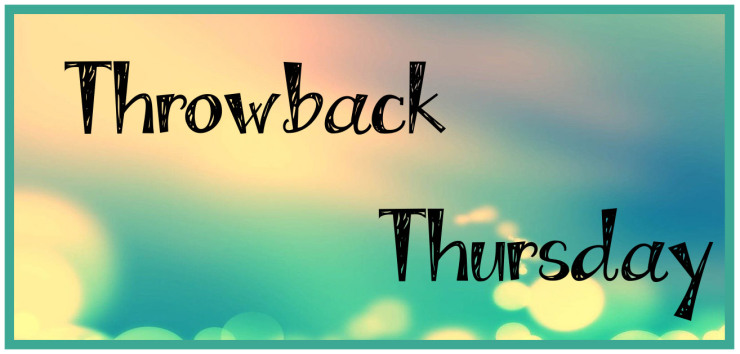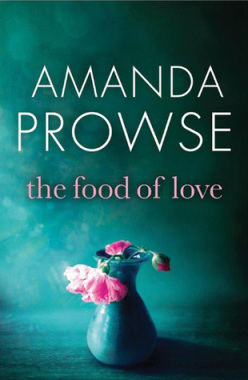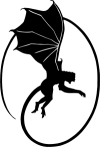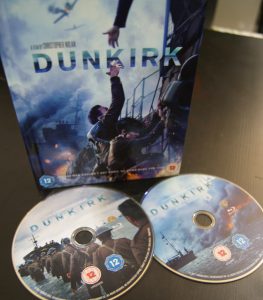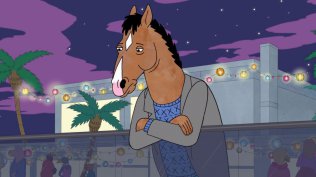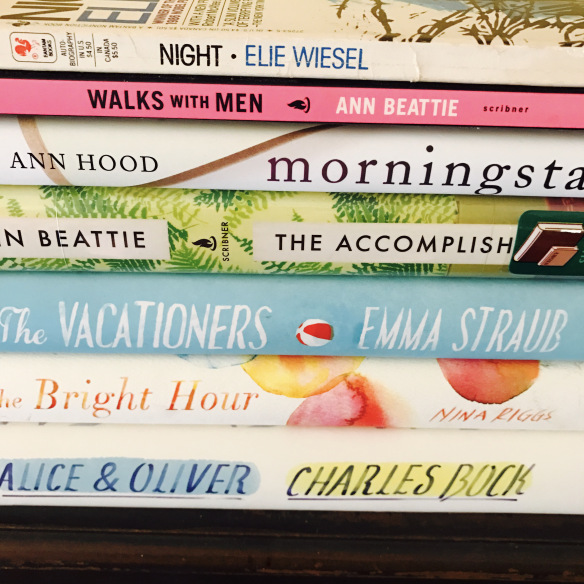
“Alice & Oliver” a novel by Charles Bock
There she was, Alice Culvert, a little taller than most, her figure fuller than she would have liked.
Looking back it is interesting that the novel starts with her physical looks, and the mundane concerns so many women have about their bodies. Those concerns are swiftly replaced by literal life and death concerns with Alice’s sudden cancer diagnosis. Her life as a fashion designer, wife and new mother morphs into life as a patient fighting for her life. We get an intimate look at a marriage and what it means to vow to stay together in sickness and in health. Flaws that every marriage has are magnified under such duress. We are also offered a realistic look into our feeble healthcare system as Oliver struggles to handle not only the day-today care of their infant, Doe, but the monetary costs of a life threatening illness as he navigates the insurance labyrinth.
A passage I love:
She raised her head from the stretcher; snow stung her cheeks. For long moments she almost believed some peculiar form of magic was indeed waiting for her. Alice could not help herself: she extended her tongue.
“The Bright Hour- A Memoir of Living and Dying” by Nina Riggs
The call comes when John is away at a conference in New Orleans.
Yes, I read this memoir about cancer and a marriage right after reading the novel about cancer and a marriage. Not on purpose. Got a little freaked out that the Universe was trying to tell me something. Prepare me for something.
Nina Riggs is a poet, wife and mother who is diagnosed with an aggressive breast cancer at the age of 37. It all started with one small spot. Within a year, she was terminal. Through her poet’s eye and mind, she is able to look carefully within and around her to describe what it is like to live “with death in the room.” She calls on writers she has loved over the years to help her make sense of this new, brief yet full world she is now living in. She manages to make us laugh as she becomes determined to find the perfect couch to leave behind for her family and to laugh and cry as she reveals conversations with her husband and sons. It is a breathtaking book that calls on us all to live each moment fully no matter how close death is standing next to us. Because, really, we never truly now how close it may be.
A passage I love that breaks my heart:
Around 4 a.m. I feel his hand on my back. “I’m so afraid I can’t breathe,” he whispers.
“I know,” I say, scootching a little toward him but still facing away, “So am I.”
“The Vacationers” a novel by Emma Straub
Leaving always came as a surprise, no matter how long the dates had been looming on the calendar.
I meant to take this on vacation with me back in May because reading about a vacation on vacation sounded fun. But then I forgot to pack it. It all worked out though because reading this book felt like a vacation in itself as she described the lush scenery, the scrumptious food.
The Posts, Franny and Jim, are on a two-week trip to Mallorca to celebrate their 35th wedding anniversary. Their daughter, Sylvia who has just graduated high school is looking to lose her virginity before heading off to college. Their son Bobby comes with his older girlfriend who is a fitness buff and rubs Franny the wrong way. Franny’s best friend, Charles has come with his husband. Everyone’s problems has followed them to this beautiful vacation spot. As a food writer, Franny throws herself into feeding her family and friends all while a seething resentment lurks just beneath the surface. Over the course of 14 days, things that are hidden are revealed and things that should be revealed stay hidden. A funny, touching glimpse into the messiness of family and friendship.
A sentence that made me laugh out loud:
Like most things, sex got better with age until one hit a certain plateau, and then it was like breakfast, unlikely to change unless one ran out of milk and was forced to improvise.
“The Accomplished Guest” stories by Ann Beattie
“There’s no copyright on titles,” he said. ”It wouldn’t be a good idea, probably, to call something Death of a Salesman, but you could do it.”
I remember reading her first collection, “Distortions” and had no idea it had been published 40 years ago. When I was first learning to write, I would read her stories, each one seeming like its own little master class in the form.
These feel the same way. Entering a short story by Ann Beattie is to enter a world fully formed. In this collection people wander in and out of each other’s lives as guests, as hosts, as visitors. The settings will be familiar to Beattie fans: strewn up and down the east Coast from Maine to Key West. Spanning events from birthdays to anniversaries, all explore reunions with people we used to know and the people we all used to be.
A sentence I love for its sensuality:
He broke off a bit of bread and breathed in its yeasty aroma; he pushed the point of his knife into some sunflower-yellow butter, well tempered, and smeared it over the bread’s pocked surface.
“Morningstar- Growing Up with Books” by Ann Hood
When I was four years old, for reasons no one in my family could explain, I picked up my older brother Skip’s reading book and read it.
I love reading about how books have influenced lives, especially when it’s the life of a writer I adore like Ann Hood. She takes us on a journey through her life via the books that wormed their way into her psyche, helping to form the woman she became. We learn about the books of her teen years from The Bell Jar to Marhjorie Mornigstar. We learn what books stoked her political fire and which led her to want to travel the world. It’s a beautiful tribute to books, to reading and how they can change—or even save—our lives.
A sentence I love for reading my own heart:
But not to me—no, I understood that I would always buy books, that I was a reader and a writer and that to be surrounded by books would always bring me comfort.
“Walks with Men” fiction by Ann Beattie
In 1980, in New York, I met a man who promised me he’d change my life, if only I’d let him.
I came across this slim volume of fiction nestled in the used books stacks of a local bookstore. An Ann Beattie book I hadn’t read yet? Sold!
I guess, technically, this would be considered a novella. But it really seems to exist outside of a genre. It echoes Beattie’s own trajectory as a successful young woman arriving in New York City, ready to be a writer and all that entails.
No sooner has Jane, a valedictorian from Harvard, arrived in the city when she strikes up an odd yet intense deal/relationship with Neil, a writer 20 years older than her. He promises to tell her anything at all, as long as it is unattributed and that nobody knows about their relationship. Having been in a secret relationship myself at one point, I wanted to scream, No, run. Don’t do it. Of course, Jane doesn’t run. She stays and Neil proceeds to educate her by laying out rules from wearing only raincoats made in England to having sex in an airplane bathroom. His certainty about everything both seduces and repels Jane. When his certainty is found to be a mask for his deceptions, Jane must decide who she is and who she wants to be.
A sentence I love for surprising me:
Sailors know how to train their eyes on the horizon to avoid seasickness. When you’re landlocked in New York City, look at the farthest curb, which, in its own way, is the horizon line.
“Night” by Elie Wiesel
They called him Moshe the Beadle, as though he had never had a surname in his life.
I’ve had this book on my shelves for over twenty years. I remember Oprah mentioned it on her show and I went out and bought but could never quite bring myself to sit down and actually read it. Well, with everything going on in our country right now and in the world, it felt imperative that I read it.
After reading it, it feels imperative that we all read it.
As a young Jewish boy, Wiesel and his family are rounded up and carted off to concentration camps. What horrified me was how even as it was happening, they didn’t really believe it was happening. They believed that somebody would stop it. That it wouldn’t be allowed to go so far. Perhaps the idea of such unadulterated evil is too hard for the human mind to process.
It was hard for me to process as I read it. It’s a first hand account of what it was like to be targeted based on your religion, deemed less than by others who sought to erase your very existence.
I read every word.
We should all read every word.
And heed every word.
Before it’s too late.
A passage that haunts me:
Night. No one prayed, so that the night would pass quickly. The stars were only sparks of the fire which devoured us. Should that fire die out one day, there would be nothing left in the sky but dead stars, dead eyes.
Advertisements Share this:
